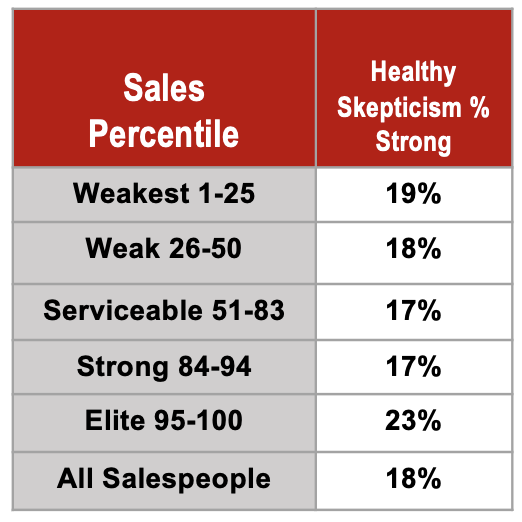assessments
-
You Can’t Lose Customers or Salespeople – 2 Secrets to Their Retention
- July 6, 2022
- Posted by: Dave Kurlan
- Category: Understanding the Sales Force

There were lots of articles that had the top 5, 7, 10, 12, and 15 reasons why salespeople leave or quit their jobs. Most of those lists were simply subsets of other lists and the reasons included things like compensation, morale, workload, changing quotas, culture, toxic management, the job was misrepresented, too much pressure and lack of growth opportunity. While there were no surprises to these lists of reasons, I think there is a more pervasive reason that is not represented on the lists created by marketers and recruiters:
Sales Selection.
-
When Salespeople Can’t Close Closable Business – The Bob Chronicles Part 7
- February 14, 2022
- Posted by: Dave Kurlan
- Category: Understanding the Sales Force

So what did Bob get himself into this time?
It’s a huge opportunity that Bob has been nurturing for years and several months ago his prospect, a top executive that has the influence and authority to make a decision, confided that he would like to find a way to do business and not only that, have this be part of his legacy.
-
How to Prepare for the Coming Sales Team Super Storm
- September 22, 2021
- Posted by: Dave Kurlan
- Category: Understanding the Sales Force

My first reaction was that this must have been something from 2016 – right before the boom that lasted until the pandemic slammed the economy to the ground. Or, from the 4th quarter of 2020, when we expected the economy to come roaring back. But it simply can’t be something that is remotely relevant to what we are about to experience. Here’s what we know, and how that will impact companies and their sales teams in 2022.
-
The Chainsaw Massacre and Building Sales Teams
- September 14, 2021
- Posted by: Dave Kurlan
- Category: Understanding the Sales Force

Despite the existence of both a science and a process for hiring salespeople, most efforts also tend to be hit or miss and the emphasis always seems to be on miss. There are plenty of reasons why, and we can discuss some of them, but the biggest and most insane reason is…
-
Follow This Advice to Schedule More Meetings and Spend Less Time Doing It
- August 25, 2021
- Posted by: Dave Kurlan
- Category: Understanding the Sales Force

Regular readers know that I’m all about the data and I have written nearly two thousand articles based on data from Objective Management Group’s (OMG) assessments of more than two million salespeople. Occasionally however, I see data where incorrect conclusions have been reached and like the toad on the window, my conclusions run counter to theirs. One such example is a beautiful infographic from sales playbook company Xant. I am going to share some of their data, graphics and conclusions and I’ll provide my counter argument to their conclusions.
-
MUST READ: Are Assessments as Evil as the Persona Movie Suggests?
- April 7, 2021
- Posted by: Dave Kurlan
- Category: Understanding the Sales Force

That’s the problem with the documentary Persona – The Dark Truth Behind Personality Tests. The movie shines the spotlight on the well-known Myers-Briggs Personality Type Indicator and swings between those that love knowing, being and relating to one of the sixteen personality types; versus those who are trying to change laws to prevent assessments like this from being used as a pre-employment test.
The film mocks those who embrace the Myers-Briggs while advocating for the elimination of pre-employment assessments. The film focuses on people who believe they were harmed and branded as unemployable as a result of being rejected for work – supposedly because of their test results. Kyle Behm was one of those people and he committed suicide while the movie was being filmed. The advocates against personality testing for employment issue the dire warning that everyone is or will be negatively impacted by personality assessments.
The film takes five huge leaps of faith and expects viewers to leap along with them:
-
Good Bob, Bad Bob, The Stockdale Paradox, and Sales Success
- February 2, 2021
- Posted by: Dave Kurlan
- Category: Understanding the Sales Force

Happy Ears is a Big Problem for most salespeople. When it’s a strength, Objective Management Group (OMG) calls it Healthy Skepticism. The challenge is that Healthy Skepticism is unlike the other selling strengths and weaknesses measured by OMG, where great salespeople have them as strengths and weak salespeople have them as weaknesses. With Healthy Skepticism there is little differentiation between strong and weak salespeople.
-
The Problem With Having Crappy Sales Managers
- November 11, 2020
- Posted by: Dave Kurlan
- Category: Understanding the Sales Force

Sales Managers underperform at a mind boggling level. Let me show you the degree to which most sales managers are unqualified.
-
The Best Solutions for Hiring Great Salespeople for Your Company
- August 28, 2020
- Posted by: Dave Kurlan
- Category: Understanding the Sales Force

These are all examples of inappropriate solutions to the simple question, “What is the best way to get there from here?”
How about the simple question, “What is the best way to assure that the salespeople I am about to hire will succeed in the chosen role?”
-
The Sales Force with Over Achievers That Don’t
- March 26, 2009
- Posted by: Dave Kurlan
- Category: Understanding the Sales Force
I heard about a CEO who told one of my colleagues that all of his salespeople over achieve. In the same phone conversation he mentioned that sales are down 20%. Can you imagine where sales would be if his salespeople under achieved?
- 1
- 2

